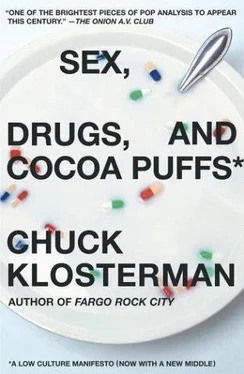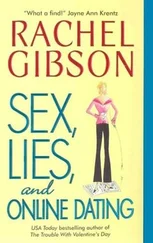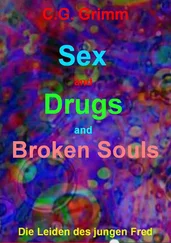Now, is aspiring to be as sexually informed as Lenny Kravitz a sad commentary on modern ambition? Perhaps. [44] 5. Well, actually, “yes.”
But that’s not the issue. The issue is that something that’s probably bad (i.e., porn) is helping us achieve something that’s probably good (i.e., delivering a technological notion to the common man).
Yet one question remains:
Why don’t women need this?
If this theory is all true, why are 99 percent of porn sites directed toward heterosexual men? Wouldn’t this imply that females can’t fathom the difference between the real and the virtual, even though they all obviously do? Why can women comprehend the power of the Internet without masturbating to JPEG images of dehumanizing sex acts? And why would no intelligent woman ever feel the need to rationalize her own weakness by arguing that her perversion actually expands her mind?
I can only assume it has something to do with licking your own nipples.
(“kitty cat as terrorist” interlude)
I’m pretty careful when it comes to my socks. Certain philosophers (Emilio Estevez in St. Elmo’s Fire, for example) have speculated as to why socks so often get lost whenever people do laundry, but—until recently—that had never happened to me. In the span of fourteen years, I never lost a single sock. But then I lost a sock in October of 2001. And then I lost another two weeks later, and then a third around Thanksgiving. And it slowly dawned on me that something was afoot. “What in the name of Andrew W.K. is going on?” I asked aloud while sorting my freshly cleaned garments. Why were my socks suddenly disappearing like Chinese panda bears? What had changed?
The answer: Mr. Smokey.
It occurred to me that the only aspect of my laundering that had changed in recent weeks was my newfound affinity for petting a feline of unknown origin. Accessing the public laundry room in my apartment complex required that I briefly walk outside of my building’s back door, where I consistently encountered a large gray cat I liked to call “Mr. Smokey.” Despite our initial differences, I struck up an amicable relationship with Mr. Smokey; whenever I saw him, I would scratch his kitty ears and his kitty tummy, much to his kitty delight.
Or so it seemed.
Evidence began to mount suggesting that Mr. Smokey was using this weekly exchange as a diversion to steal my socks, one at a time. It’s still not clear why he wanted my socks, since it had always been my assumption that kittens wanted mittens (in order to acquire pie).
However, there was no other explanation for these disappearances. In fact, I have reason to believe there was a whole network of cats involved in this: Perhaps Mr. Smokey stole my attention while a second cat (or cats) pounced into my laundry basket, snaring the best available footwear and fleeing into the darkness. I’m convinced an even larger cat ( “Mr. Orange”) from a neighboring building was part of this conspiracy.
“How often have I said,” asked coke-addict Sherlock Holmes in The Sign of Four, “that when you have eliminated the impossible, whatever remains, however improbable, must be the truth?” This is true; I am nothing if not logical.
Mr. Smokey must die.
10 The Lady or the Tiger 1:19
It’s no secret that cold cereal was invented to help nineteenth-century Victorians stifle their rampant sexual desires. Any breakfast historian can tell you that. Sylvester Graham (1794–1851), a so-called “philosopher and nutrition crusader,” was the kind of forward-thinking wackmobile who saw an indisputable connection between a person’s decadence and their eating habits; this was partially augmented by his perception that the medical profession was wicked. “Disease is never the legitimate result of the normal operations of any of our organs,” he wrote, a sentiment that would eventually spawn the creation of Quisp.
Mr. Graham suspected that bad food and inappropriate sexual desires—particularly masturbation—were the true cause of every major illness. This made the cure for all sickness relatively simple: sexual moderation (i.e., less than thirteen orgasms a year for married couples, which actually seems reasonable), daily exercise, and a proper diet.
By 1840, Graham’s career was in shambles; this does not seem altogether surprising, considering he was insane. However, his well-argued insanity influenced a New Yorker named James Caleb Jackson, and Jackson embraced Graham’s philosophy on his way toward creating a bad-tasting wafer out of graham flour and water. He called his food “Granula” (a precursor to Granola). Jackson was force-feeding his wretched Granula in his Dansville, New York, sanitarium when it was discovered by Ellen Harmon White, a Seventh-Day Adventist. She adopted the idea and started her own sanitarium in Battle Creek, Michigan, in 1866. In need of a staff doctor, White hired a scrappy young physician named John Harvey Kellogg. John hired his brother, William, as clerk of the institute.
John Kellogg was also a disciple of the Graham philosophy and agreed that a flavorless, grain-based food was precisely what America needed. By 1902, he had conjured a way to produce flake cereal—the ideal medium for a crunchy, soulless pabulum. He tried to make wheat flakes, but the technology for such a innovation did not yet exist. Corn flakes, however, worked swimmingly.
Initially developed for scientific purposes, corn flakes struck the brothers Kellogg as a savvy business opportunity. This crispy treat seemed perfect for a society assumedly filled with oversexed, disease-ridden lunatics. And while selling cereal made money, it also raised ethical dilemmas: The angelic White was devastated that the Kelloggs were making money from a food designed to improve human purity. Meanwhile, John Kellogg was upset that his brother added sugar to the flake recipe to improve sales, a supplement he believed would liberate the public libido and turn every corn flake aficionado into a raging sexaholic. The Kellogg brothers eventually sued one another. After winning the lawsuit, William Kellogg took control of the enterprise; his puritan brother remained a stockholder.
Years later, a trio of Rastafarian elves would promote puffed rice.
Today, few members of the scientific community see a close connection between cold cereal and sex, although advertisers still did in the 1950s. Early Corn Flakes commercials showed Superman eating cereal with Jimmy Olsen, but never with Lois Lane; this was to keep viewers from inferring that Superman and Lois Lane had spent the night together (evidently, the notion of Superman and Jimmy Olsen having a homosexual relationship was not a concern). However, sex is not the central theme to modern cereal advertising. In fact, selling cereal is not the central theme to cereal advertising. Saturday morning commercials for all the best cereals are teaching kids how to figure out what’s cool. They’re the first step in the indoctrination of future hipsters: Cereal commercials teach us that anything desirable is supposed to be exclusionary.
An inordinate number of cereal commercials are based on the premise that a given cereal is so delicious that a fictional creature would want to steal it. We are presented with this scenario time and time again. The most obvious is the Trix Rabbit, a tragic figure whose doomed existence is not unlike that of Sisyphus. Since the cereal’s inception, the rabbit—often marginalized as “silly”—has never been allowed to enjoy even one bowl of his favorite foodstuff, and the explanation for this embargo smacks of both age discrimination and racism (we are to accept that Trix is reserved exclusively “for kids”). [45] 1. Proof that America is ultimately a sympathetic nation surfaced in 1976, when a consumer election sponsored by General Mills indicated that over 99 percent of Trix eaters felt the flamboyant six-foot rabbit deserved a bowl of Trix, which places his approval rating on par with Colin Powell in 1996.
Читать дальше












